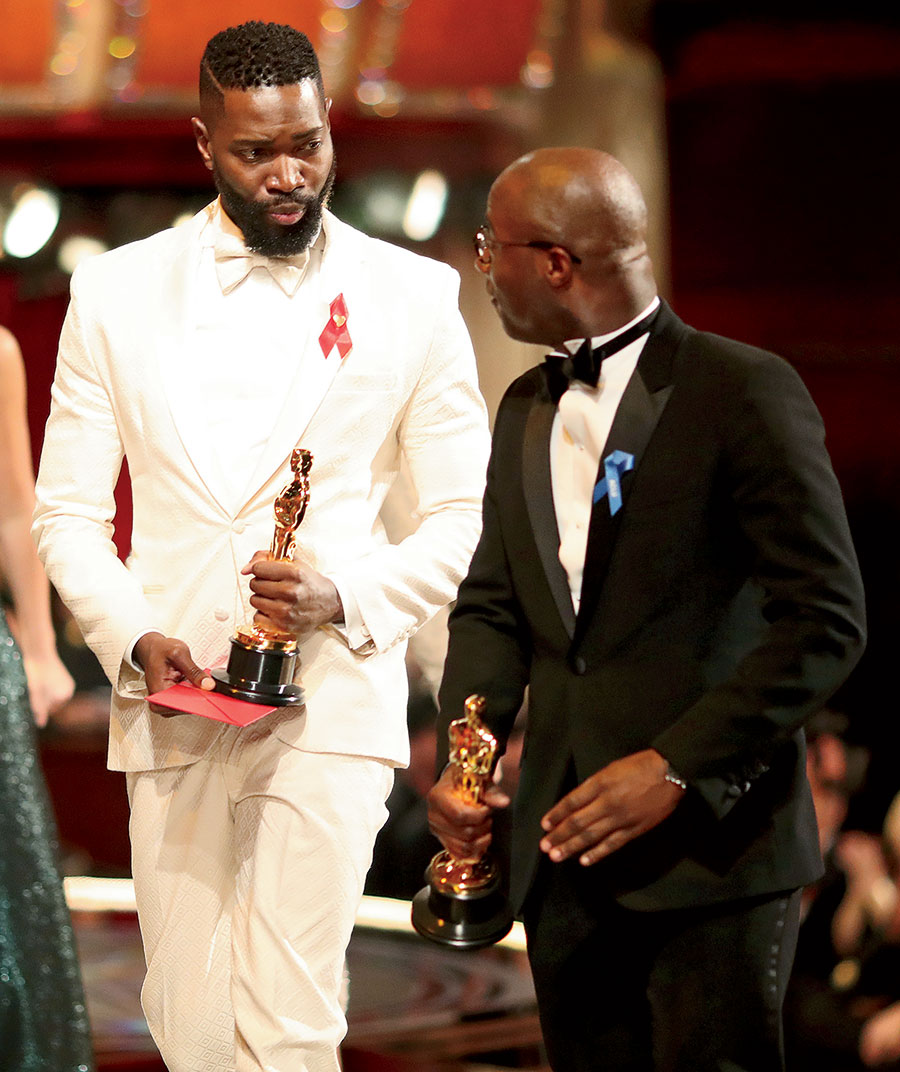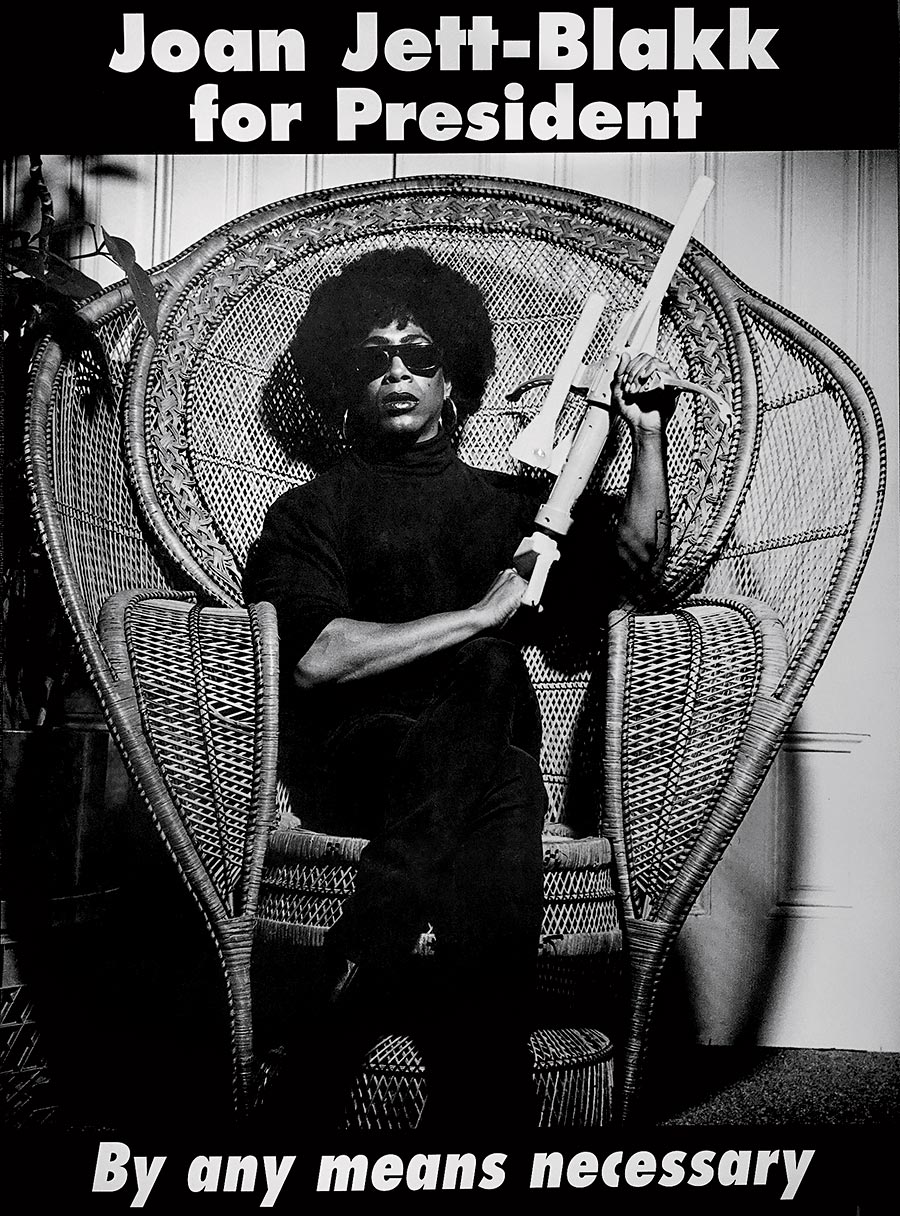Tarell Alvin McCraney is trying not to overthink performing onstage again. “It probably makes more sense to repeat ‘You wrote this down and you’re saying it in front of some folks, calm down,’ ” the playwright says over coffee at Steppenwolf Theatre’s Front Bar. “Because otherwise I’ll just be like” — and here he adopts a mock-ponderous tone — “ ‘What does it mean to be an actor again?’ instead of listening and paying attention.”
McCraney, of course, is much better known for his writing. The 38-year-old received a 2013 MacArthur Foundation “genius” grant for his body of stage work and, most notably, shared an Oscar for the adapted screenplay of 2016’s Moonlight, which won best picture. And though he has an acting degree from DePaul, he hasn’t put it to much use in, oh, the last decade and a half. His last stage gig was in 2004, a Steppenwolf Garage production called Theatrical Essays, just before he headed off to Yale to pursue a master’s in playwriting.
This month, though, McCraney will hit the stage at Steppenwolf, where he’s an ensemble member, to perform the lead role in a play he co-wrote called Ms. Blakk for President. He’ll portray Joan Jett-Blakk, a black Chicago drag queen and activist. At the height of the AIDS crisis, Blakk launched a semisatirical campaign for president, representing the Queer Nation Party and crashing the 1992 Democratic National Convention. “It’s a Chicago story, it’s a queer story, and a black story,” McCraney says. “What these folks at Queer Nation and ACT UP did during that time, I’m just reaping the benefits of it.”

Which is one reason he felt obligated to perform the part himself. “As a queer black artist, it’s important that the body and voice be mine.” But he adds one caveat: “I don’t claim to be a great actor. I claim to be a fine actor. I can get up there and do it fine, and it paid my bills for a while.”
Theater, in fact, was a lifeline for McCraney early on. Much like the central character in the semiautobiographical Moonlight, he grew up amid deep poverty in Miami’s Liberty Square housing projects. His mother struggled with drug addiction, and neighborhood kids targeted McCraney as queer before he himself fully understood who he was. Then a high school counselor steered him toward an improv program, which paved the way for McCraney to attend high school at Miami’s competitive New World School of the Arts and eventually the Theatre School at DePaul University.
His mother died of AIDS-related complications in 2003, right after McCraney graduated from DePaul. It was then, while he was still living in Chicago, that he wrote the first draft of what he called In Moonlight Black Boys Look Blue. It sat for about a decade before Barry Jenkins reworked it into the screenplay for the film he directed.
McCraney says he always envisioned the story as a movie. “It was never a play. It might’ve been a bad film script,” he says with a grin. “I mean, there were parts of that story that were underwater. But even in my ability to stretch what we can do onstage, that kind of verisimilitude could only be captured on camera.”
He recalls the moment he realized Moonlight might be a bigger phenomenon than he — or anyone involved — expected. It came at a screening at the Toronto International Film Festival in September 2016. “The film’s over, and I’m emotional, mostly because I hadn’t seen it in an audience this big with other people. I was like, I love this little film that’s ours. And then everybody stood up at the end of the credits. And it became everybody’s.”
The Oscar attention instantly raised McCraney’s profile, enough to lead to a pair of screen projects. In February, Netflix premiered High Flying Bird, a satire of the sports business written by McCraney and directed by Steven Soderbergh. And McCraney is the creator and executive producer of David Makes Man, a series launching this summer on OWN. “It’s about a kid in magnet programs who’s using his giftedness to navigate his world,” McCraney says. The boy invokes W.E.B. Du Bois’s concept of double consciousness. “It’s the ability as a black person in your own neighborhood to speak a certain way, then go into a white neighborhood and speak completely differently, because that’s how you can deescalate situations,” a practice more commonly referred to today as code switching. “You can stave off being arrested.” He pauses. “Well, maybe.”
Those aren’t the only things keeping him busy. In January, McCraney had his Broadway debut with a Manhattan Theatre Club production of Choir Boy, another coming-of-age story he wrote — this one centering on an openly gay student in an all-black boys’ boarding school. And between jetting to New York, Los Angeles, Miami, and Chicago for various projects, McCraney was at Sundance and South by Southwest to promote the screen productions. These days, he also spends considerable time in New Haven, Connecticut, where he is chair of the Yale School of Drama’s playwriting department.

“My schedule has been terrible and I need to do better about pacing myself,” McCraney says. “But a part of the trauma of growing up in poverty is that you’re taught that you have to do everything at once. Otherwise you’ll never get a chance to do anything else again. I have to often remind people that Oscars don’t come with any monetary reward.”
Committing to three months in Chicago to rehearse for and perform in Ms. Blakk will force him to slow down, at least for a little while. McCraney joined Steppenwolf’s ensemble in 2010, the same year it produced the Chicago premiere of his The Brother/Sister Plays, a trilogy set on the Gulf Coast and borrowing elements from the Yoruba mythology of West Africa. Fellow ensemble member Tina Landau helmed that production. And it was Landau who, after reading about Joan Jett-Blakk’s presidential campaign in the 2008 book Out and Proud in Chicago, brought the idea to McCraney. “It’s a story that is not widely known and deserves a place in history and, in particular, queer history,” Landau says.
The play comes at an important time for Steppenwolf. Under Anna Shapiro’s leadership, the company has been aggressively expanding — it is breaking ground on the next phase of its building extension — and diversifying both its core ensemble and the material it’s producing, perhaps shedding the last vestiges of its early identity as a macho boys’ club. And so McCraney wants to be a visible part of that, not just as a headshot in the season brochure but as a presence onstage. “For me it is a moment where politically it’s important for the bodies in the space to represent the work. I know that I can tell my stories in a way that only I can.”
Details:Ms. Blakk for President May 23–July 14. Lincoln Park. Steppenwolf Theatre. $15–$94. steppenwolf.org




